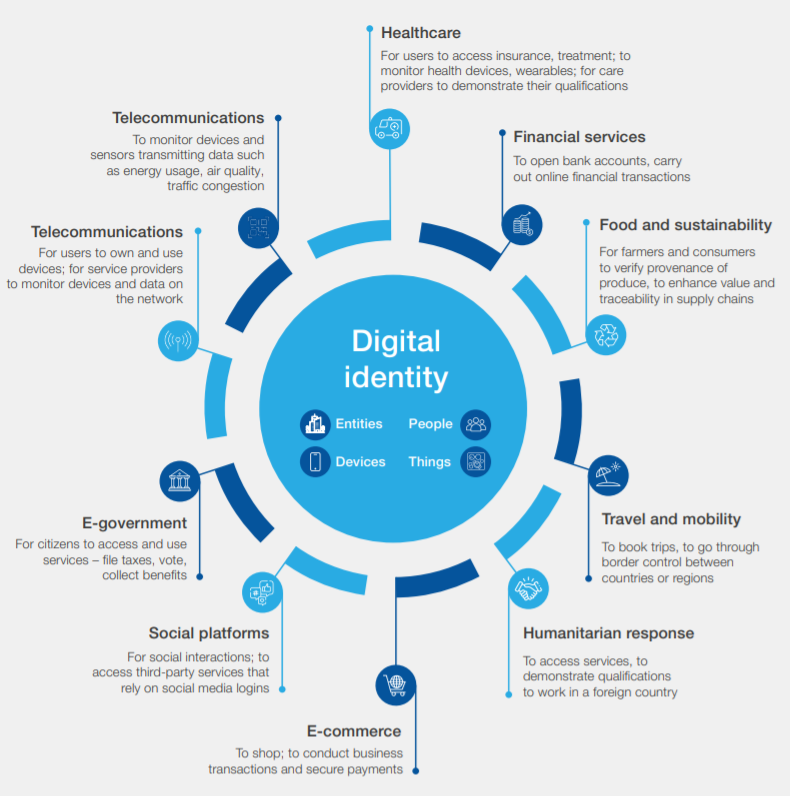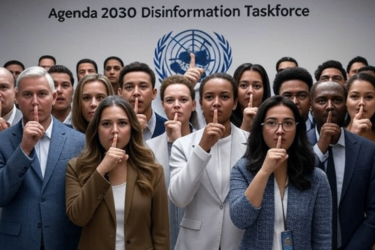The architects of the great reset will stop at nothing in their pursuit of mass digital ID for all: perspective
The World Economic Forum (WEF) is “reimagining digital ID” with a new report admitting that digital ID is exclusionary by nature and “may weaken democracy and civil society.”
The WEF’s “Reimagining Digital ID” insight report for June 2023 confirms what we at The Sociable and countless others have been warning about for years — that digital ID is exclusionary by its very nature, that digital ID can be used as surveillance tool to coerce individuals into modifying their behavior, that digital ID is a prerequisite to the issuance of Central Bank Digital Currencies (CBDCs), and a whole lot more.
“Digital ID may weaken democracy and civil society”
Reimagining Digital ID, WEF, 2023
According to the report, “the greatest risks arising from digital ID are exclusion, marginalization and oppression,” and that “requiring any form of ID risks exacerbating fundamental social, political and economic challenges as conditional access of any kind always creates the possibility of discrimination and exclusion.”
Discrimination and exclusion were in abundance during the COVID-19 pandemic when vaccine passports were introduced and championed by the architects of the great reset agenda.
These vaccine passports, which the WEF has admitted “serve as a form of digital identity,” barred citizens all over the world from participating in many aspects of society despite the fact that the “vaccines” themselves were never proven to prevent transmission and that they were never even tested for transmissibility, as was revealed in the EU Parliament last year.
“These [vaccine] passports by nature serve as a form of digital identity”
Advancing Digital Agency: The Power of Data Intermediaries, WEF, 2022
Despite risking exclusion and potentially weakening democracy and civil society, the unelected globalists still believe that digital ID is a public good, and with this new report, they are highlighting decentralized digital ID as the path forward.
According to the report, “Decentralized ID is a form of digital ID that enables individuals to control the sharing of their data, while allowing multiple entities to issue credentials to them.”
Decentralized digital ID; however, does nothing to prevent exclusion.
Sure, they can say that you have control over the sharing of your data, but if you don’t want to share that data, then you will be denied access to certain goods and services.
It’s like when you click “accept” on the terms and services of any app. If you don’t accept, you don’t get to use it.
The same concept applies to digital ID and participating in many aspects of society.
“By reifying conditional access, ID is, by its very nature, exclusionary“
Reimagining Digital ID, WEF, 2023

When it comes to addressing exclusion, the WEF report suggests that “Efforts aimed at addressing exclusion should carefully consider the potential for coerced consent, especially among vulnerable populations.”
However, this wasn’t the case when the unelected globalists went all-in on pushing vaccine passports that were used to coerce consent by threatening people’s livelihoods if they dared to refuse the jab.
The WEF “Reimagining Digital ID” report indirectly acknowledges this type of marginalization and oppression, stating, “In cases where sensitive data is collected, there are also risks of marginalization and oppression, with ID being used to facilitate the identification, surveillance and persecution of individuals or groups.”
Is that not what vaccine passports were all about — identification, surveillance, and persecution?
They certainly weren’t about promoting public health.
In fact the World Health Organization (WHO) explicitly stated in August 2021 that COVID vaccine passports “may increase the risk of disease spread” due to the fact that “the extent to which each vaccine prevents transmission of SARS-CoV-2 to susceptible individuals remains to be assessed.”
In complete contradiction to the above statement, the WHO last week launched the “global health digital certification network,” which “builds upon the experience of regional networks for COVID-19 Certificates and takes up the infrastructure and experiences with the digital European Union Digital COVID Certificate (EU DCC) system.”
“A health pass based solely on individual vaccination status may increase the risk of disease spread”
Digital Documentation of COVID-19 Certificates: Vaccination Status [DDCC:VS]: Technical Specifications and Implementation Guidance, World Health Organization, 2021
The global vaccine passport system run by the WHO was proposed at the 2022 B20 Summit in Bali Indonesia.
There, Indonesia’s Minister of Health and former banker Budi Sadikin stated that the G20 should adopt WHO-standardized vaccine passports at the next World Health Assembly.
“Let’s have a digital health certificate acknowledged by WHO — if you have been vaccinated or tested properly — then you can move around”
Budi Gunadi Sadikin, Indonesian Health Minister, B20 Summit 2022
While the WHO was announcing it was expanding its vaccine passport/digital ID scheme last week, the architects of the great reset were publishing their “Reimagining Digital ID” report that said such an expansion could lead to coercion without meaningful informed consent.
According to the report:
“As an ID system expands, the consequences of not participating in it can become so severe as to make registration effectively unavoidable.
“When access to a good or service is conditioned upon the possession of a form of ID, and that ID is widespread, individuals may be effectively coerced into obtaining that form of identification, even if there is no legal basis for requiring it.
“Likewise, for populations lacking digital literacy, it may be impossible to obtain meaningful informed consent.”
After years of public backlash to digital ID schemes, the WEF and partners are very much aware of how unpopular their ideas are.
For this, they wish to educate the public about why it needs digital ID.
“Without public education, clear utility and incentives, decentralized approaches to ID may be unable to garner the broad stakeholder buy-in and user demand required for mass adoption,” the “Reimagining Digital ID” report reads.
The unelected globalists blame conspiracy theories as one reason for a lack of public acceptance to digital ID.
“There is an especially high communications barrier, made worse by the myriad conspiracy theories linking digital ID to untrue and malicious speculations,” the report reads.
“Some nations are beginning to understand digital ID as a prerequisite to developing a central bank digital currency (CBDC) and other payment innovations”
Reimagining Digital ID, WEF, 2023
At the same time, the report validates concerns that were considered “conspiracy theories” in the not too distant past, such as digital ID potentially weakening civil society and being a prerequisite to CBDCs.
According to the report, “Digital ID may weaken democracy and civil society. For example, digital IDs issued by social media companies can contribute to political polarization by reinforcing group identities.
“While decentralized ID offers a way for individuals to exercise greater control over their personal data, depending on its use context, it could still contribute to polarization.”
Regarding CBDCs being inextricably linked with digital ID, the report adds:
“Some nations are beginning to understand digital ID as a prerequisite to developing a central bank digital currency (CBDC) and other payment innovations.”
“The greatest risks arising from digital ID are exclusion, marginalization and oppression“
Reimagining Digital ID, WEF, 2023
The architects of the great reset will stop at nothing in their pursuit of mass digital ID for all.
These digital ID entry points include, but are not limited to:
- Digital ID for Climate: To track individual carbon footprints and prove climate refugee statuses
- Digital ID for COVID: To mandate vaccines passports leading to mass compliance while providing the digital framework
- Digital ID for CBDC: To adopt identity verified solutions in order to eliminate anonymity and record every transaction
- Digital ID for Cybersecurity: To exploit cyberattacks as a means to kickstart national identity systems and to create a passport to the metaverse
- Digital ID for Convenience: To create an all encompassing, interoperable framework in order to enable all life situations
The lengths to which public and private entities will go to in justifying their digital identity rollouts are seemingly never ending.
Unelected globalists and governments alike are claiming digital identity schemes are necessary to mitigate the effects of COVID, climate change, and cyberattacks, all while championing the elimination of anonymous transactions in favor of a fully traceable, fully interoperable, and fully programmable CBDC.
Ultimately, digital identity schemes can give governments and corporations the power to manipulate, coerce, or incentivize changes in human behavior while eliminating individual agency, autonomy, and anonymity under a system of social credit.
Image by rawpixel.com on Freepik












